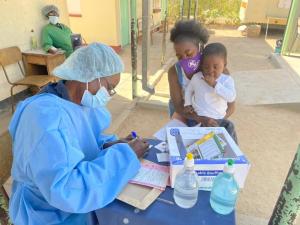Zimbabwe tackles typhoid with new vaccination campaign
Harare - Constane Sigu was watching television at home one evening in Bulawayo in southwest Zimbabwe when the Ministry of Health and Child Care’s (MoHCC) advertisement for its new Typhoid Conjugate Vaccine (TCV) campaign caught her attention.
The following morning, she was at the nearby Cowdray Park Clinic with her 3-year-old niece, after also mobilising several of her neighbours to join her. “As the child’s legal guardian, l have to make sure l protect her, particularly because there are high incidences of typhoid in this area,” she says. “l am very happy that she received her typhoid vaccine.”
Constance's niece is one of millions of children to benefit from this new campaign, launched by the Ministry of Health and Child Care on 21 May this year with support from the World Health Organization (WHO), Gavi, the vaccine alliance and the United Nations Children’s Fund (UNICEF). The first of its kind in the African Region. The initial 10-day vaccination drive between 24 May and 4 June saw more than four million children vaccinated against typhoid. The campaign has since been extended in a bid to reach a final target of just under six million children. The vaccine has also been successfully added to Zimbabwe’s routine immunization schedule.
“In the recent past, Zimbabwe has been affected by a number of typhoid outbreaks, with cities like Harare, Bulawayo and Gweru often becoming the epicentres due to chronic poor Water Sanitation and Hygiene (WASH) conditions caused by water shortages,” says Zimbabwean Vice President and Minister of Health and Childcare Dr Constantino Chiwenga. “Against this backdrop, the introduction of typhoid vaccines becomes a critical public health measure.”
The new campaign has integrated the Typhoid Conjugate Vaccine with the Inactivated Polio Vaccine, and the Human Papillomavirus vaccination. In addition, children aged six to 59 months have received Vitamin A supplementation. Since the end of the initial 10-day campaign, the typhoid vaccine is now being administered routinely to all children at nine months of age to protect them from typhoid fever.
"The Typhoid Conjugate Vaccine is a significant step towards addressing the high rates of typhoid in children in Zimbabwe, and the Zimbabwean government deserves credit for successfully incorporating it into its routine immunization programme,” says Dr Alex Gasasira, WHO Representative to Zimbabwe. “We are proud to be able to support them in their efforts.” Dr Gasasira also noted that Zimbabwe’s introduction of the Typhoid Conjugate Vaccine through an integrated campaign realized the strategic priorities of the Immunization Agenda 2030, launched in 2020 by WHO, UNICEF and Gavi.
Through health promotion training and technical support from WHO and UNICEF, health authorities have empowered Village Health Workers across the country to educate communities, and to encourage caregivers to access the integrated vaccinations for their children. As a result, Village Health Workers have become critical stakeholders in Zimbabwe’s Expanded Programme on Immunization.
“Having been a village health worker for 37 years, I have seen so many people die from vaccine preventable diseases. l have learnt a lot about the importance of vaccines, and it is my duty to continue encouraging my community to bring their children for vaccination,” says 76-year-old Gladys Masamba, a VHW from Mbire District in northern Zimbabwe.
WHO and UNICEF, along with other partners, have also mobilized funds for the procurement and distribution of vaccines and the installation of cold chain equipment to ensure that they are kept under the required storage conditions.
Furthermore, in addition to training health workers on how to administer the new vaccine, WHO and UNICEF have also trained local journalists on how to report correctly on the campaign, and assisted with the production of radio, television and newspaper inserts. In doing so, WHO and its partners have played an integral role in ensuring that as many caregivers and communities as possible benefit from the campaign.



